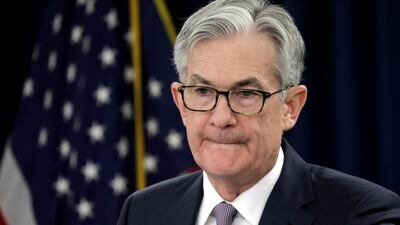US Federal Reserve chairman Jerome Powell kept rates unchanged and signalled the central bank would pull out the stops to combat a global disinflationary downdraft, foreshadowing a potential shift towards an easier monetary policy over time.
The Fed left its benchmark interest rate at 1.75 per cent. Mr Powell said he is intent on evading the downward spiral in inflation and inflation expectations that has plagued other countries, in comments to reporters on Wednesday after the two-day Federal Open Market Committee (FOMC) meeting.
“We have seen this dynamic play out in other economies around the world, and we are determined to avoid it here in the US,” he said.
The strong words suggested that the central bank is moving towards a major change in how it interprets its price-stability mandate as it completes a review of its policy framework by mid-year.
“The likelihood of a hike by the US Fed now looks vanishingly unlikely,” wrote Daniel Richards, Emirates NBD Mena economist, in a research note on Thursday.
The return of risk-off sentiment has manifested in treasuries, as yields on the two-year US Treasuries fell back below 1.40 per cent Wednesday after the brief recovery to 1.46 per cent at the start of the day, according to ENBD.
“The market implied probability of a rate hike at the next meeting in March has fallen from around 12 per cent to 0 per cent, with no hikes priced in through January 2021,” the report said.
Under the new approach – which Mr Powell emphasised is still under consideration — the central bank would try to make up for past deviations from its 2 per cent target, rather than treating misses of the goal as bygones, as it does now.
With inflation having run more or less consistently below that goal since it was introduced in 2012, such a shift would likely result in a more dovish Fed as policymakers sought to pump up prices and the economy.
“We’re not satisfied with inflation running below 2 per cent, particularly at a time such as now where we’re a long way into an expansion,” Mr Powell said.
The Fed’s preferred gauge of price pressures – the personal consumption expenditures price index – rose 1.5 per cent for the 12 months ending in November. Mr Powell said inflation is expected to move closer to 2 per cent over the next few months thanks to so-called base effects, “as unusually low readings from early 2019 drop out of the calculation”.
The persistently "below-the-target inflation seems to annoy Fed Chair Jay Powell", wrote Ipek Ozkardeskaya, a senior analyst at Swissquote Bank in Dubai in a research note, and "his irritation is made official with the downgrade of household spending from ‘strong’ to ‘moderate’".
"If we were to label the Fed’s position following Wednesday’s decision, we would definitely say ‘dovish’," added Ms Ozkardeskaya.
Mr Powell said the Fed is happy with the stance of monetary policy after cutting interest rates three times last year. And the central bank is likely to remain that way unless the economic outlook changes materially – no matter what President Donald Trump – who just this week again called for lower rates – may want, the Fed chair made clear.
Trade uncertainty has eased, though it has not disappeared, and global growth looks to be bottoming out, with the economic fallout from a spreading coronavirus still a wild card, he said.
"There is likely to be some disruption to activity in China and globally," Mr Powell said. "It's very uncertain how far it will spread and what the [economic] effects will be in China, for its trading partners, and around the world … We are very carefully monitoring the situation."
Even so, Mr Powell said "there are signs and reasons to expect" a global economic rebound. He said the initial US-China trade agreement and a new trade pact among the US, Canada and Mexico that Mr Trump signed into law on Wednesday could potentially boost the US economy.

